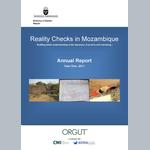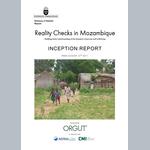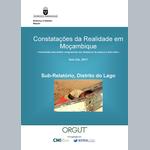Defining poverty from below
How do the poor define poverty, and what are their ideas and strategies for improving their situation? These are the crucial questions in the project “Reality Checks in Mozambique, 2011-2016". In a series of studies, a team of researchers led by senior researcher Inge Tvedten from CMI, will enquire into the poor population’s perceptions of poverty. The answer to the question will provide SIDA and Mozambican authorities with important information on how to implement policies targeting the poor in the best way possible.
Poverty is never equal
‘Poverty is never equal’ is a Nyanja proverb. For Mozambicans, this proverb conveys real life in a strikingly precise manner. In Niassa, the province where the studies are carried out, poverty is seen as twofold; material poverty and poverty in regard to social relations.
Over the past decades, there has been an impressive economic growth in Mozambique. Some are undoubtedly enjoying the benefits of the flourishing economy, but the majority of Mozambicans remain poor. Markedly, Mozambique has seen the emergence of a group of ultra and chronically poor.
-They are effectively trapped in poverty. The poorest are unable to make use of the poverty alleviation strategies implemented by the authorities, says Tvedten.
According to Tvedten, the failure to improve the situation for the poorest touches a nerve in Mozambican society and is widely debated. Policies targeted directly at the ultra poor are needed to solve the poverty challenges in Mozambique. Female headed households are also vulnerable to poverty and deprivation, partly due to the strong social stigma connected to living without a husband. Like the ultra poor, these are in need of tailored policies for poverty reduction.
The power of tradition
In the Niassa province, local chiefs, queens and religious authorities still have a lot of power. Their power has long historical roots and represents continuity for people standing outside the ever-changing political power structures in Maputo. The power of tradition is a challenge for state authorities, but represents a safety net for the poor. There is a strong sense of community, and if someone is struggling, the local network is mobilized providing material and social support.
-These safety nets illustrate the challenges of poverty, particularly in cities. When people move from the rural areas to urban districts, they frequently lose the opportunity to maintain and establish social relationships with the extended family back home.
-If you are socially isolated, you are vulnerable. It is hard to cope with a crisis, for example a loss of income or extraordinary expenses. Even affluent individuals are vulnerable if they are socially isolated, says Tvedten.
In the eyes of the poor
Although the power of tradition is a safety net for the poor, it represents a challenge for state authorities and policy makers. Poor Mozambicans turn to the state for solving problems regarding education, health and infrastructure matters. Yet, when it comes to their daily lives and inter-relations, they do not trust the state.
-Many have a very clear, and misguided, perception of the responsibilities of the state. The state has a limited scope for action in this area of Mozambique. This has implications for policy. There is a need for more openness and transparency, says Tvedten.
More openness and transparency is one of many recommendations from the team of researchers performing the reality checks. Their first annual report is published, four more are to come. The “Reality Checks” is an in-depth study, and the researchers focus on selected districts and families. The families will be interviewed and asked to elaborate on their perspectives on poverty. Over a period of five years, the researchers will go to Mozambique on several occasions to see if the dominant perceptions of poverty change and whether there is any actual change. The qualitative approach will provide knowledge on the dynamics of poverty that quantitative data are unable to provide. The study has a particular focus on good governance, agriculture/climate and energy/infrastructure, which are key sectors in the Swedish development cooperation with Mozambique.
In line with the objective of defining poverty from below, the researchers will not only present the findings to SIDA and Mozambican authorities, but also to the selected communities in Niassa.
Publications

Reality checks in Mozambique. 1st Annual Report - Baseline

Reality checks in Mozambique. Inception report.

